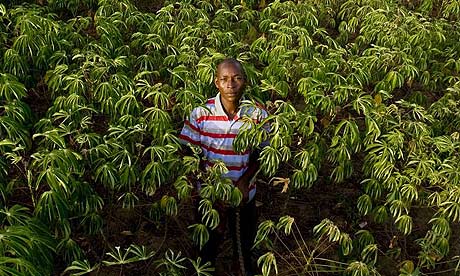It's about time the world focus on more sustainable and empowering solutions. If you'd look at poverty mitigations that the West provides, you would observe that their systems create dependency from foreign aid which doesn't work out in the long run. The World Bank or IMF lends money to African governments on the promise of economic and social development. Allegedly, these governments pocket the money that's supposed to feed millions of impoverished families. Of course there are the NGOs, but how much do they really involve people in their decision making processes? How certain are they that their poverty reduction strategies doesn't just look good in theories, but will actually be carried out by the people?
Africa has taken matters in their own hands. Millions of small farmers are slowly becoming businessmen or agri-preneurs. The continent has systems that's innate in their nations and has worked for the past centuries. We can even trace it back to the time of Cleopatra. The key here now is not to introduce new systems and force Africa to adapt to it because it's proven to work in their researches and theories.

What Africa has benefited most from foreign aids, aside from the infrastructure (roads, bridges, dams), in my opinion, is not the strategies themselves, but the inspiration that something can be done. I'd like to believe that they were empowered to be proactive by these humanitarians. Hopefully, these Africans will be able to inspire their fellow brothers as well.
I can't help but compare Africa's situation to that of the Philippines. Zooming into the problem of urban poverty, the best way to treat it might lie in the innate skill of Filipinos to be "madiskarte." The solution then is not to provide them with jobs, but to put them in a situation that would exercise their pagiging madiskarte. Entrepreneurship might just do the trick. I think the government then should invest more in free workshops that would embrace these skills and provide poor families mentors to grow their businesses. Like the Africans, we don't need more jobs that would just feed the engines of capitalism. We need poor people providing jobs to their fellow poor.
Together with the shift of corporations from just cold general producing of merchandise to tailor fitting products and services for the unarticulated needs of the consumers, the government can also tailor fit more their poverty reduction strategies so that it would become "more personal" to the families concerned.
The government has been trying to curb poverty in the last decades with their big budgets for education, housing... Maybe it's time to change their approach. If they can't effectively execute projects targeted for the mass poor, it's time to change their strategy by concentrating on few families at a time. These fortunate few families in turn should be trained to give back by inspiring other families to defeat poverty. Think of it as multiplying agents of change. If these poor Africans can inspire their brothers to rise above poverty, why can't we?

1 comment:
with its many natural resources, africa could feed itself. it's just being exploited by a more powerful nation same as what they do to mindanao, toggling their development, pinning the consumption of their natural resources.
btw. i'm back to blogging. thanks for the encouragement.
Post a Comment